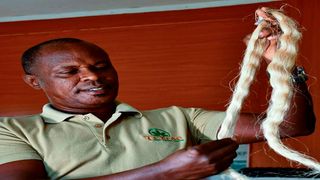
Kimani Muturi, managing director of TexFad plant, displays hair extension made form fibres extracted from the sheaths of banana trunks at a workshop in Sonde settlement of Mukono.
| Courtesy | Abubaker LubowaNews
Premium
Green beauty: Ladies, here’s banana fibre hair extensions
What you need to know:
- The idea to make biodegradable extensions was sparked by two university students who were on apprenticeship at Kimani’s company
As countries around the world ban plastics and move away from synthetic fibre, a company in Uganda ran by a Kenyan has set its sights on the beauty industry, producing biodegradable hair extensions.
The extensions come in different colours, and when they grow old or you get tired of them, you only have to put them in your organic waste bin.
When they get to the farm, they will rot and make your soil more fertile.
Muturi Kimani, 51, is the founder and managing director of Texfad Ltd, which processes textile fibres from banana stems and uses them to manufacture carpets, yarns and hair extensions.
The idea to make biodegradable extensions was sparked by two university students who were on apprenticeship at the company years back.
“One day the two were learning how to extract banana fibres and attached some to their hair as extensions. I was fascinated by how they looked with the fibre on their heads and posted on my Facebook page as a joke. Later, I thought deeply about it and decided to implement the same,” says Kimani.
In 2016, he contacted one of his former students to help him develop a procedure to make the hair extensions. However, they had a lot of challenges, and they decided to give it a break.
“I later did some research on softening plant fibres with a view of softening banana fibre like cotton that could be used to weave fabrics and make garments.
“During one of my failed trials, I came up with a hair-like substance from banana fibres. I was so excited and I did more trials until I developed the hair extensions,” he adds.
That breakthrough happened this year.
His preference for bananas is driven by the fact that they are widely grown in East Africa for food, which means it is easy to access raw material for his products.
He adds that he frequently witnessed farmers disposing the stems as waste within the banana plantations, and that they are rarely given to animals as fodder.
“As long as banana is eaten as food, I will always get raw materials and sometimes even for free. Even when the banana plantation is attacked by banana wilt and other diseases, I will still get my raw material,” he says.
“Besides, the world is moving away from synthetics. Many countries, including Kenya, have banned the use of polythene. The next ban might be synthetic materials that make hair extensions. Who knows? The good thing with our product is that once it is used, it can be disposed of in a garden as manure,” he says.
Kimani currently sources banana stems from farmers and makes use of a banana fibre extractor that his team designed.
“We used to take five days, but now we can make the product within a day. The machine can extract about 10 kilogrammes of fibre, but this capacity is still low,” he adds.
With just two workers dedicated to producing the hair extensions, Kimani hopes that with the right equipment, he will soon produce in bulk and sell to retailers.
Some varieties of the banana plant are better suited for making the hair extensions. As a result, Kimani looks forward to establishing a plantation that will produce the specific banana fibre he needs.
“Besides the hair extensions, we also produce carpets and table mats. We have also sampled softened banana fibre for production of fabric for garment making. Soon our clients shall have banana fibre textiles as an alternative choice for their clothing needs. We are also working on banana ‘leather’ with an intension of making banana shoes, belts and bags,” he reveals.
“Banana fibre is the next sustainable material that will be useful in many industrial applications. What we are doing is just a small contribution to what I see banana fibre doing in the near future. It is also good for Africa to start innovating their own products from the natural resources that they have,” he concludes.





